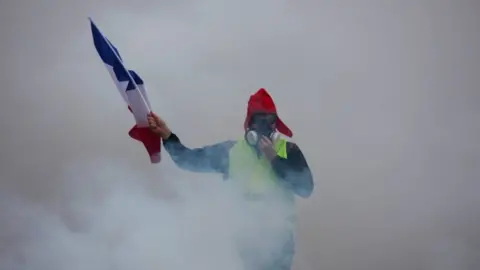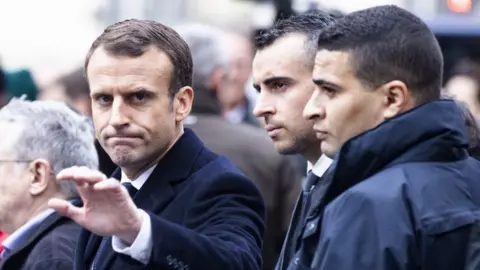France fuel protests: Ball in Macron's court after violence
 AFP
AFPThere is a ritual after French riots which requires government, protesters and the media all to insist that it was the work of a minority.
That way the protest movement shucks off responsibility, the government pretends the problem is not as serious as it appears, and the media avoid accusations of tarring everyone with the same brush.
Anyone who witnessed what happened on Saturday knows that is pious rubbish.
The notion that the vast majority of "gilets jaunes" (yellow vests) were tut-tutting in the background, shaking their heads in shocked condemnation of the "violent few", is unsustainable.
Most of the yellow vests who arrived off the Arc de Triomphe knew perfectly well what was likely to happen.
They may not all have been at the battle-front. That was taken over by professional revolutionaries of the far left and far right - working (a fascinating sign of the times) side by side.
But they were not far behind. And they certainly weren't tut-tutting.
The point is that there is in France a tolerance of street violence which is incomprehensible to outsiders. Thank the country's revolutionary past.
And today among the millions who support the gilets jaunes - and their basic point about middle-class impoverishment - you will likely get three kinds of reaction to Saturday's riots:
- I dislike violence but if you push the people too far, this is what you have to expect
- If there hadn't been violence, why would the government take the problem seriously?
- The violence was provoked by the police, and the French media are hiding the truth.
This last reaction is surprisingly widespread - a sign of the conspiracy mentality that so easily pervades any social media movement.
Government gesture
For President Emmanuel Macron, then, it would be most unwise to treat the riots simply as a law-and-order issue.
The protesters who turned out in Paris are not now recoiling in horror at the monstrosity they conjured up. They are merely keeping it on a leash.
 EPA
EPAAnd they are waiting for the president to enact the next step in the elaborate pas-de-deux which is French social negotiation.
What the ritual requires now is a gesture from the government that shows that it has not just listened, but that it is prepared to appease.
That is how, since time immemorial, French social conflicts have been resolved.
The difficulty for Emmanuel Macron is that this is exactly the kind of capitulation to the street that he has vowed to stop. There will be no change of direction, he repeats to all who will hear, because that would only store up worse problems for the future.
Every president's dilemma
But the pressure on the president is now enormous, and it must be assumed that some time this week - certainly before Saturday when more protests are possible - the government will make an "announcement".
It will be a crucial moment. Could they agree to suspend the next rise in fuel tax, due next month? Could they announce an above-inflation rise in the minimum wage? Could they release more money to compensate the poor?
But any major concession would smack of the old French politics, and destroy Macron's political persona as a harbinger of the new. Some say it would write off any chance of further reform in the rest of his mandate.
Or will it be just the promise of more consultations? And the risk of the gilets jaunes kicking that back in his face with another day of violence.
It is the dilemma that eventually faces every French president. If you don't give in, then there's more violence for which - this being France - the protesters don't get the blame. You do!
